Thursday, 30 November 2017
Wednesday, 29 November 2017
Representations on front pages
- There is a stereotypical lower class youth that has been portrayed by the Sun in this image.
- The paper is being very stereotypical in the way it has pictured the youth in the photo, with them dressed in a tracksuit, trainers wearing a balaclava and a man bag.
- It has managed to create this representation due to a variety of media language. Firstly, the man has been pictured with the fire in the background which gives him a look of danger and destruction. Also, the lighting adds to his mysterious and danger due to the dark grey areas surrounding him and around the flames. Another point to add is that the man is in the foreground and is large which makes him seem threatening to the reader which creates a negative feeling towards the majority of youths and people that wear tracksuits.
- The Sun have reported the riots as 'mindless violence' which represents them as delinquents that go round destroying society. This will eventually rub off onto the whole of the reader's thoughts about all youths which is very negative as lots of teenagers are very positive members of the community. It also makes it sound as if they had no reasoning behind their brutal attacks when it was actually fueled by a police shooting. As well as this it is also reported that the 'riots spread across London', the use of the word 'spread' makes it sound as if the teenagers are a disease ruining the city. Finally, they have put the number of arrests in large text on the front page which to show the extent of the damage that has been caused.
- This story does fit with the codes of convention of newspapers, firstly, it says it is the third day so the article has continuity to interest the readers and retain readership numbers. Furthermore, the story applies to the negativity code because it is all about crime and a negative reception of the youth community in London.
Tuesday, 28 November 2017
Polarizing News Articles
Terrorism:
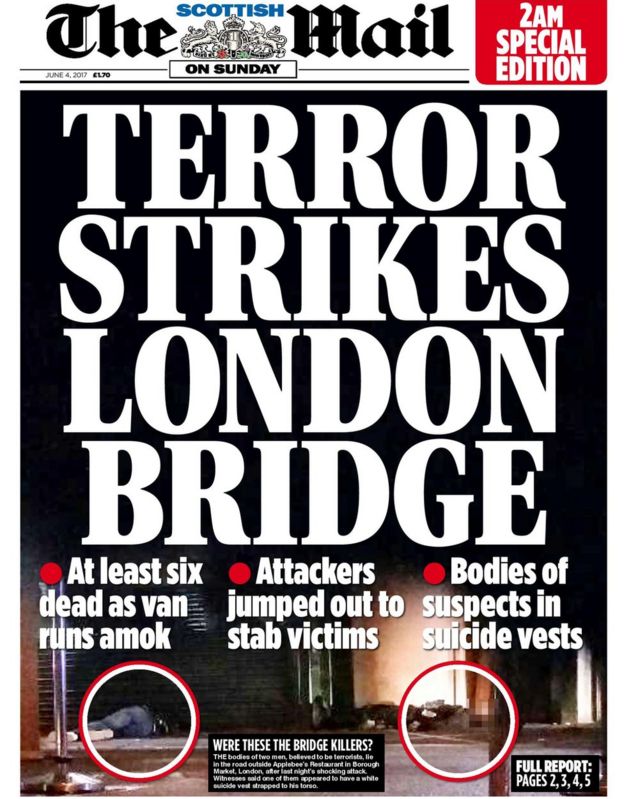
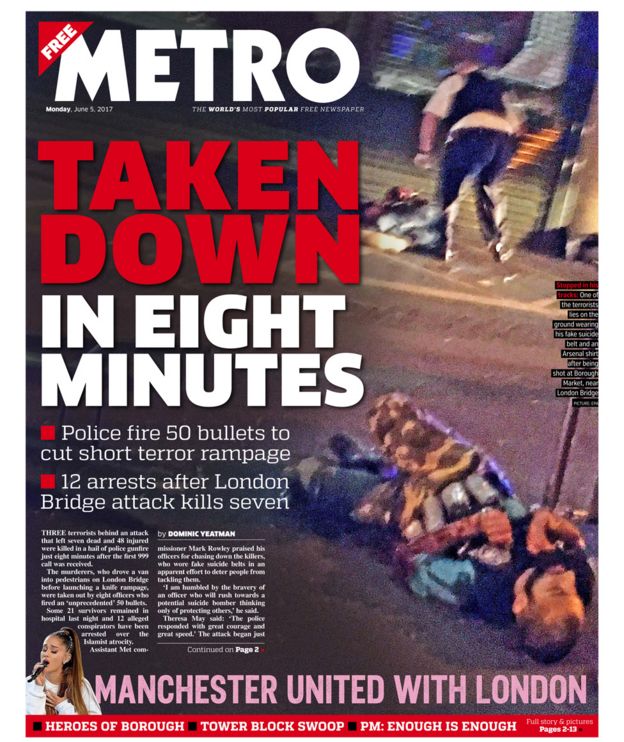 The two newspapers: The Mail and the Metro have taken very contrasting approaches to reporting the disaster of the London terror attacks earlier this year. The Mail has lead the story as 'TERROR STRIKES LONDON BRIDGE' which sums up the very negative sequence of events. However, the Metro focuses at the heroic responses of the police force who managed to take down the terrorist in eight minutes. The Mail has used images of the victims dead on the floor which makes the reader feel as if there is no hope and Britain has been defeated. Whereas, the Metro shows the police officer attending to the injured and affected which influences the audience to thinking there is hope and London is fighting back.
The two newspapers: The Mail and the Metro have taken very contrasting approaches to reporting the disaster of the London terror attacks earlier this year. The Mail has lead the story as 'TERROR STRIKES LONDON BRIDGE' which sums up the very negative sequence of events. However, the Metro focuses at the heroic responses of the police force who managed to take down the terrorist in eight minutes. The Mail has used images of the victims dead on the floor which makes the reader feel as if there is no hope and Britain has been defeated. Whereas, the Metro shows the police officer attending to the injured and affected which influences the audience to thinking there is hope and London is fighting back.
Brexit:
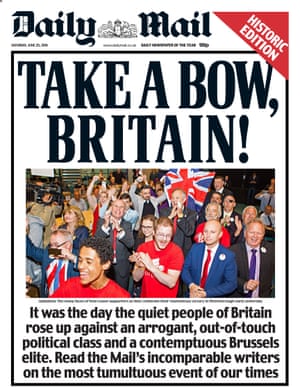
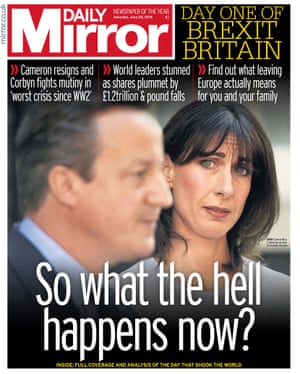
Thursday, 23 November 2017
Tuesday, 21 November 2017
Monday, 20 November 2017
Bias in newspapers
- Bias through pictures/graphics- camera angle/ caption. The photo has Theresa May in the foreground with supporters clapping in the background making her look empowered.
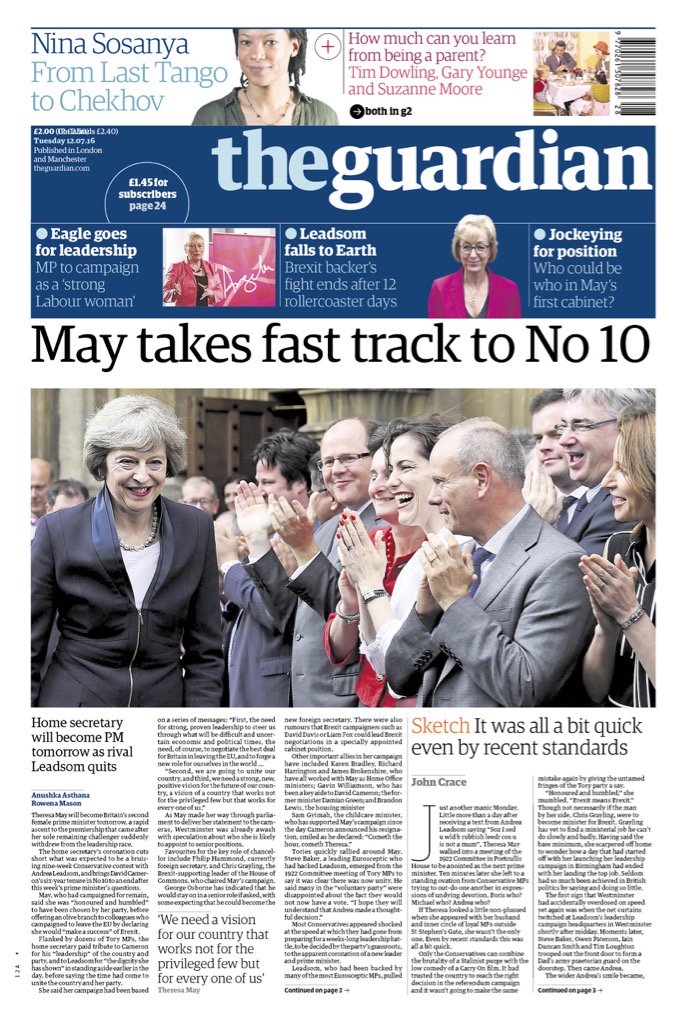
- Word choice and tone in the body of the text. This article portrays the Labour Party as "rabble" with a 'poor election campaign'.

- Choice of journalist and sources- who is writing them? (beliefs) and who have they got the information from? This article is from Dan Bloom who is a renowned labour supporter who is promoting labour, pro-Europe and anti David Cameron front pages.

- Bias through where the article is placed- is it prominent or is it hidden? This article shows the aftermath over the Grenfell tower disaster which is prominent on the front cover due to the extremely powerful threshold of the article it could not be missed.
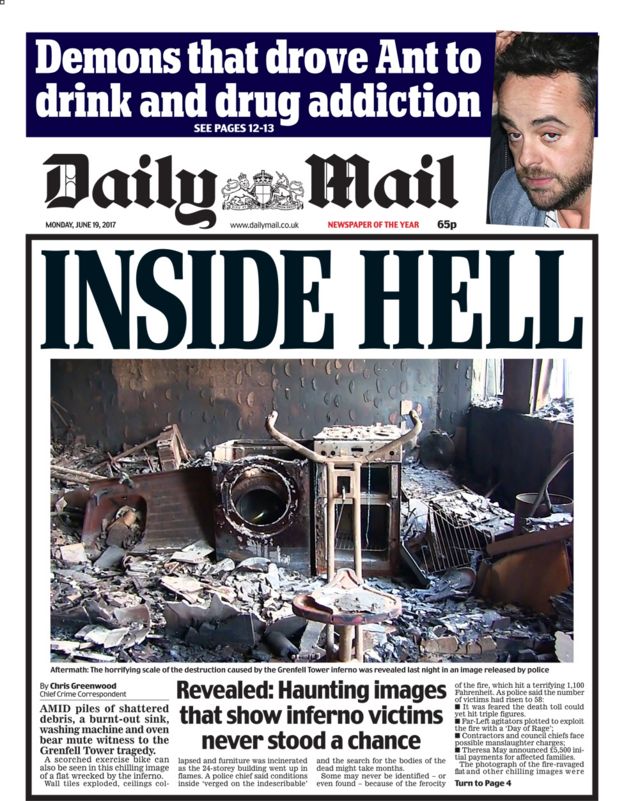
- Bias through omission or selection- whether an article is even published. This article was from the day of the queen being found out of being involved in the tax evasion scandal, which they have chose not to report in support of the royal family.

- Bias through choice of headline. As you can see by the headline the sun are clearly against the labour leader Jeremy Corbyn and have not minced their words against hi.
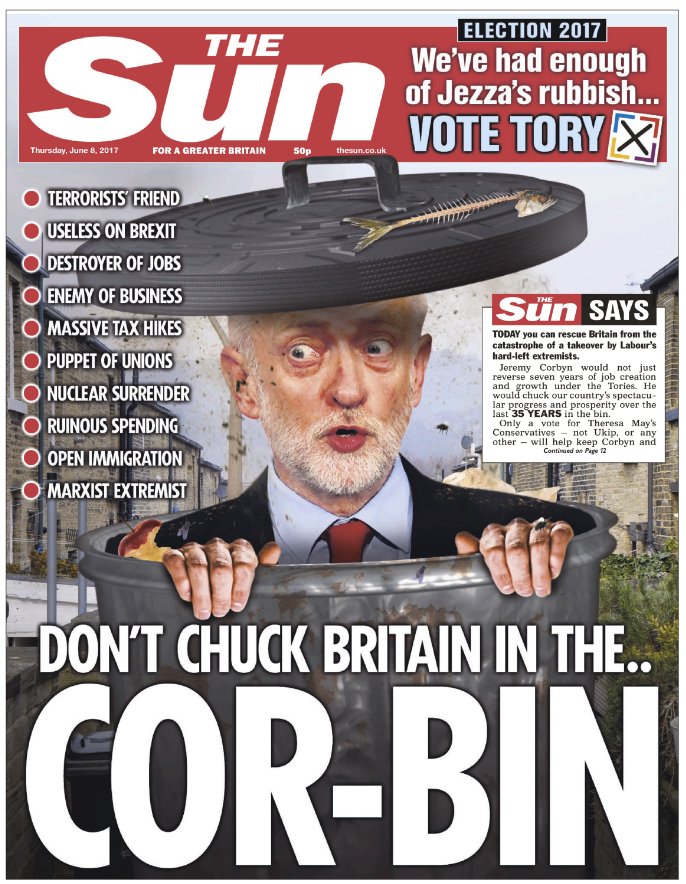
- Bias by use of names and titles- ('terrorist' or 'freedom fighter'), as you can see the daily star have portrayed the man clearly as a terrorist due to the awful actions he has gone to, however this could be seen as just because he is of Islamic faith.
-
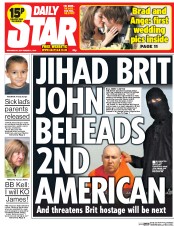
- Bias through statistics and crowd counts, this stat has been used in order to make people panic about the number of immigrants entering the UK and go against Cameron and his pledge.
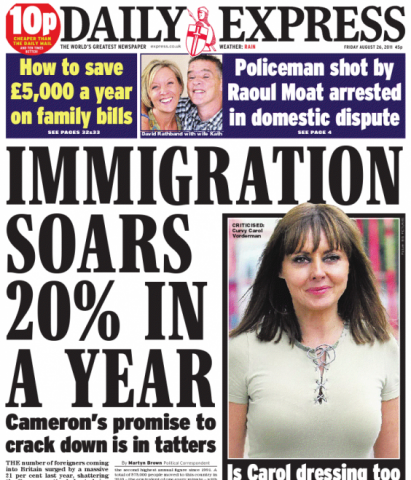
Thursday, 16 November 2017
Pros and Cons of online news
Pros:
- Free
- Immediacy
- Easy navigation
- Unlimited space
- Interactivity
- Can't be ruined
- Make changes and edited (up to date)
Cons:
- Phone/ tablet needed
- Connection needed
- fake news
- hack able
- troll comments
- skim news
- older generations may struggle
Tuesday, 14 November 2017
Newspaper Screencast
https://drive.google.com/file/d/1vWQSyp1j_dmkXGAjZlOqiNBN8WE17S0U/view
https://drive.google.com/file/d/1EbdG8nWRImZZAHUvbWkJNygIhIeUoA1M/view
https://drive.google.com/file/d/1OaBqiNY-yDvbCc30eRyp2E9xgGPuSuBL/view
https://drive.google.com/file/d/1DdM-tkYjIiW7rc6aSQ92ioOCV1PXatHm/view
https://drive.google.com/file/d/1YjANS0_zibS85nRmZTsmB-2Lmz5l6dNi/view
https://drive.google.com/file/d/1EbdG8nWRImZZAHUvbWkJNygIhIeUoA1M/view
https://drive.google.com/file/d/1OaBqiNY-yDvbCc30eRyp2E9xgGPuSuBL/view
https://drive.google.com/file/d/1DdM-tkYjIiW7rc6aSQ92ioOCV1PXatHm/view
https://drive.google.com/file/d/1YjANS0_zibS85nRmZTsmB-2Lmz5l6dNi/view
Saturday, 11 November 2017
Friday, 10 November 2017
Thursday, 9 November 2017
News Values
- Galtung & Ruge
- 1965- scoring system
- A story that scores highly is more likely to make the front page or new bulltin
- Threshold (impact on reader)
- Unexpectedness (shock)
- Negativity
- Elite persons/ places
- Unambiguous (easy to understand)
- Personalisation (real relatable people)
- Proximity (close to home)
- Continuity/ currency
Assessment 1A feedback
ASSESSMENT
1A - GBHS MEDIA STUDIES A LEVEL Marksheet
Name: Jack
Cook Date: 31/10/17 Mark: 65
AO1: Demonstrate knowledge and
understanding of the theoretical framework of media and contexts of media and
their influence
AO2 Apply knowledge and understanding of
the theoretical framework of media to:
Analyse media products/Evaluate
academic theories/ Make judgements and draw conclusions
Level
3
|
·
A comprehensive response to the set question
·
Comprehensive and
accurate knowledge and understanding
·
Convincing, perceptive and accurate analysis
·
Convincing, perceptive and accurate evaluation
·
Highly developed and accomplished judgements
and conclusions
The
response demonstrates a highly developed and detailed line of reasoning which
is coherent and logically structured. The information presented is entirely
relevant and substantiated.
|
Level
2
|
·
An adequate response to the set question
·
Adequate and generally accurate knowledge and understanding
·
Adequate and generally successful analysis
·
Adequate and
generally successful evaluation
·
Adequate and
generally well-reasoned judgements and conclusions
The
response demonstrates a line of reasoning with some structure. The
information presented is in the most part relevant and supported by some
evidence.
|
Level
1
|
·
A minimal response to the set question
· Minimal application of knowledge and understanding
·
Analysis is minimal
and/or largely descriptive and may not be relevant
·
Evaluation is
minimal or brief, and is likely to be largely descriptive
·
Judgements and
conclusions, if present, are minimal with limited support
·
Information
presented is basic and may be ambiguous or unstructured. The information is supported
by limited evidence.
|
Identify a strength or strengths in your
assessment:
·
Knowledge and application of the Barthes
semiotic theory, also coming up with a wide range of denotations and
connotations.
·
Understanding of what each of the readings was
(even though I forgot the name of the second one)
·
Steven Neale theory of genre (repetition and
difference)
What are the areas you need to improve?
·
I need to improve my knowledge of the
cultivation and effects theory
·
Also, make sure I use CLAMPS and DISTINCT when
answering specific answers in the exam.
·
I need to use examples of genres where the
theory of repetition and difference has been applied.
·
I need to improve my understanding of
industries
What do you need to focus on for your next
assessment?
·
IPSO (Independent Press Standards
Organisation)
·
Levison enquiry
·
Regulation, readership/ownership and relative
statistics
·
Albert Bandura
|
Newspaper codes
- Masthead- title of the newspaper displayed on the front page
- Bar-code- use to scan the newspaper when purchasing
- Caption- brief text underneath an image describing the photograph/ graphic
- Headline- a phrase that summaries the main point of the article
- Main Image- dominant picture, often filling the majority of the front cover
- Page numbers- a system of organisation within the magazine
- Target audience- people who the newspaper aims to sell to
- Pull quote- something taken from within an article, usually said by person in the main image
- Classified ad- an advert that uses only text
- Skyline- an information panel on the front page that tells the reader about other stories
- Edition- versions/ changes to stories that some papers may print several per night
- Stand first- block of text that introduces the story
- Byline- the line above the story that gives authors details
- Body text- also known as a copy
- Standalone- picture story that can exist on its own or a front page leading to a story
- Center spread- a photograph that runs across the middle two pages
- Lead story- main story usually a splash
- Gutter- blank space between the margins and the publication
- Folio- top label for the whole page
- Page furniture- everything on the page except text or pictures of stories
Subscribe to:
Comments (Atom)
Exemplar News Q1
In source B, we see the main headline of 'you pay £36m for Calais clear-out' in a large bold sans-serif font. This use of directly a...
-
Why has Minecraft been a critical and commercial success? Minecraft is an open-world sandbox (construction) game that was created by the S...
-
D escribe I n detail S etting T hemes I cons N arrative C haracters T extual analysis We decided to choose a narrow d...
-
Media Transition work The director has used a variety of techniques in order to present the film to a wide target audience. Firstly the ...





